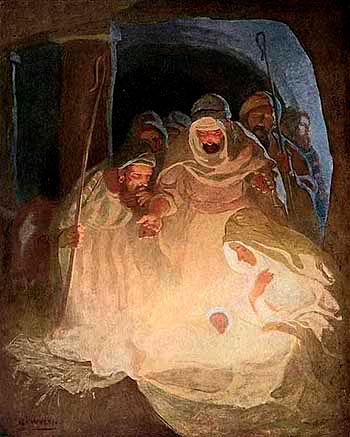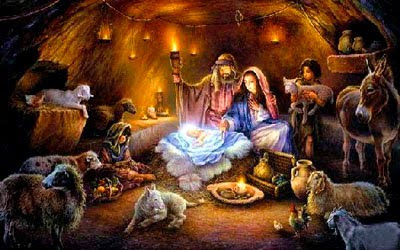
From December of 2007, a repost, because it's important (with an update):
Alright, so it's getting overwhelming, all the Christmas music, the Carols, the red and green colors on everything. Even the Salvation Army jingling their bells is getting a bit on your nerves. So what? It's once a year, and you don't have to pay that much attention to it.
Too commercialized? Well of course! This is America, Land of the Shopper! What do you expect? We celebrate the Founding Fathers with sales. We mark Independence Day with more sales. We commercialize everything we can, whenever we can. It's our way. So relax. It's not important.
What is important is to remember that this season is about Hope - true Hope. Not how many nifty gifts you get, not the cards you send and receive. Hope. That's what the Christmas celebration is all about. We mark December 25th as the day that Jesus was born, He whom we call the Christ, the Son of GOD. A true gift from our Creator. His coming gives Hope to all who have sinned - that's you! And me! - that they will be forgiven those sins, thus redeemed from Death. That's what Christmas is about. The greatest Gift ever!

Now I know, as do most of you, that some folks like to grumble that Jesus was not born in December - Winter - at all, and that the Christmas celebration is simply melded onto the ancient Pagan Saturnalia. Well, so what? It's true. And how does that change the meaning in the slightest? If you take a Butcher's Shop and clean it out, change the decor, and open a Tea Shoppe, is it still a Butcher's Shop? Of course not. That's gone and something new is in its place.
So what do we know about the birth of Jesus? Well, not so terribly much actually. We have to rely on the Gospels for much of the information, and some of it is inaccurate (Scholars believe Mark's was the first Gospel account written, and that many years after Christ's Resurrection). Now that's merely the writers' errors as they attempted to match misunderstood prophecies.
For instance, there's no archaeological evidence that Bethlehem in Judea even existed in the 1st Century. It's a small city now, but at the time of Jesus' birth it didn't exist. However, there was, and is, another Bethlehem, and it was close to Nazareth, rather than far away, as is the accepted Bethlehem in Judea (75 miles from Galilee to Bethlehem in Judea). So why did the writers describe the town as Bethlehem in Judea? Because they misread, or misunderstood, the prophecy. Here, read it with me. First the New Testament account:
"In the time of King Herod, after Jesus was born in Bethlehem of Judea…" (Matthew 2:1)
And what is the prophecy about His birthplace?
"But you, Bethlehem Ephrathah, though you are small among the clans of Judah, out of you will come for me one who will be ruler over Israel, whose origins are from of old, from ancient times." (Micah 5:2)Pretty straightforward, isn't it? But is it? You see the word 'clans' in the prophecy? Not towns or places, or villages. Clans. All that prophecy means is that the smallest of the clans among the descendants of Judah would produce the Messiah. As James Tabor said: "Everyone thinks 'Bethlehem' is a place, and indeed there were towns named 'House of Bread' in Judea and in Galilee, but...the term Bethlehem-Ephrath/Ephratah is the name of a clan of Judah--children of Caleb through Hur, who was the firstborn of an extraordinary woman named Ephrathah..." (This is found in 1 Chronicles in the Old Testament)
Would Joseph have taken his heavily-pregnant betrothed 75 miles, through a barren wasteland - home to thieves and other criminals - to a town that did not exist, for a Roman Census? No. And only males would have been required anyway. No, if Joseph really did take Mary to any Bethlehem it would have been in Galilee, where a town did exist, and which still exists today. Don't feel badly about the writers - we all misread/misunderstand things, and so did they.
Okay, so what about that whole December 25th deal? Isn't that bogus? Yep! It really is. The accounts of His birth, you might recall, included shepherds tending their flocks in the fields at night.
"In that region there were shepherds living in the fields, keeping watch over the flock by night." (Luke 2:8)
Not in the Winter. Those sheep and their shepherds would not have been in the fields in a Judean Winter night. But they would have if it was in the Spring, as some believe, or in the Autumn, as I and some others believe. Jesus was not born in the early Winter. The date the early Church chose was in fact the date of the Roman Saturnalia. They did it for precisely the reasons you would expect: to draw pagans into the fold with a festival at the same time of year as one of their old festivals. The actual date is unknown, just as it is completely unimportant. It is the birth of the Messiah that is important. Keep that in mind.
From Jesus Police:
There are various theories about Jesus' birth. Many believed that Jesus was born on January 6 (the birthday of the God Osiris). The rationale for this date was the belief that Jesus was exactly 30 years old when he died and that he died on April 6. Counting backwards from April 6 exactly 29 years and 3 months gave a birth date of January 6 (Craveri, 1967). This date was adopted by the Eastern Church and called "Epiphany" or "The Appearance."
The African Tertullian (c 160 -220 A.D.) and the Roman Hippolytus (c 170-235 A.D.) believed the date to be March 25th, the spring equinox under the ancient Roman calendar. Clement of Alexandria (c 150-215 A.D.) believed that Jesus was born on May 20, the 25 day of the Egyptian month of Pachon. None of these theories had any real facts associated with them, but they were popular nonetheless.
A 3rd Century Christian named Sextus Julius Africanus believed that March 25 was Jesus' conception and the day of Earth's creation as well. Using March 25 as the day of conception, he skipped ahead 9 months to December 25 as the birth date.
What date was it? We don't know. Nobody knows, and, again, it doesn't matter. What matters at this time of year is that most Christians are celebrating His birth, which brought into the world Hope of Salvation.
That Hope of Salvation is what all the hoopla is all about, Folks. The Carols and the decorations. Even the Santa Claus images hearkens back to a Christian Saint in most of our traditions. So rather than get huffy about all of the lights and packages, even the non-stop music (so much of it absolutely lousy!), why not remember that it means Hope. Hope for all of us.
And that was GOD’s gift to all of us!
Merry Christmas To All!

Update: More information for those who want to know more:
As always, with ancient texts, the translations from Aramaic/Greek/ Latin/Old English into our modern tongue can allow all sorts of errors to creep in, while most of the basic meanings remain. In this case take a look at the place where Jesus was born - the place where the manger was.
Luke 2:7, says:
And she brought forth her firstborn son, and wrapped him in swaddling clothes, and laid him in a manger; because there was no room for them in the inn.But the earliest text doesn't actually say 'inn' at all. From Christian Answers:
The text of Luke 2 notes there was no room for Mary and Joseph in the "inn." Unfortunately, the Greek term translated inn (kataluma) had multiple meanings, among them inn or caravansary. Used only one other time in the New Testament (Luke 22:11 and the parallel passage, Mark 14:14), it was the place where Jesus observed the Last Supper with His disciples. Here, Dr. Luke gave additional information about the kataluma. He said it was a furnished large upper story room within a private Jerusalem house. The kataluma of the last night of Jesus' earthly ministry was the "upper room."So Joseph took Mary out to the barn, right? Nooo ... not in a poor village.
We suggest the kataluma of Jesus' first night was a similar room in Bethlehem. Mary and Joseph came into town with Mary ready to deliver. Arriving at Joseph's ancestral home, they found it already full of other family members who had arrived earlier. While the exact reason space was not made for a pregnant woman is unknown, it probably indicates the house was full of elder members of Joseph's family, who had priority.
Chrstian Answers continues:
So that is when Mary and Joseph went to the barn, right? Not exactly. The Biblical account mentions neither barn nor cave—it is assumed because of the manger [and because of modern perceptions - European perceptions, mostly, that would never understand keeping livestock inside a home.]. Mangers are animal feeding troughs, and barns are where one would expect to find them. But in the ancient world, as well as in primitive modern cultures, mangers are also found within the house itself. Animals are regularly kept in homes at night.
A small number of flock animals were housed, not in attached exterior sheds, but inside the house in one of the ground floor rooms. Here, animals, tools and agricultural produce were stored. Here, too, food was prepared and possibly consumed. Family sleeping quarters were on the second floor (an upper room). By being inside, the animals were protected from the elements and theft. In addition, their presence provided body heat for cool nights, access to for the daily meal and dung as a critical fuel source.
Excavations in Israel have uncovered numerous installations within domestic structures which probably represent ancient mangers. Some are carved, but most are stone built. Wooden mangers, of course, have not survived in the archaeological record.
Consequently, Mary and Joseph did not find space in the living quarters of the ancestral family home. Instead, they stayed downstairs in the domestic stable, still within the ancestral home, where a manger or two was located. Here they were visited by the shepherds, and maybe the wise men some time later.
After all, Joseph was going home, to family. He was not a stranger, nor a poor beggar. But with room at a premium he and Mary would have to be put up where there was room - in the very room where the livestock was kept. Where the manger(s) were.
So Luke knew what he was writing, described it with enough detail for those who lived at that time. And they knew what he meant. By 1611, the year the King James Bible was first published, the translations had been corrupted as to ancient meanings. From Greek to Latin to Old English to the English of King James. A room in the house (where there was no more room) where the livestock spent the night had become a stable/barn/cave. But that isn’t what Luke described.
The birth of Christ followed the prophecies, which did not include heartless family members. But He was born in very humble circumstances, not in a palace. He was to be one with His people. His birth and life made Him that.
More thoughts about His humble birth: Jesus in a Manger

5 comments:
Benning,
Stopping by to wish you a Blessed Christmas.
The same to you and Mr. AOW! Blessings and improved health!
*CHristmas Hugs!*
That second Nativity Scene picture looks really familiar, somehow. ;-)
MERRY CHRISTMAS!!!
hiya Benning..SWEETEST HOLIDAYS to u my friend..big NY hugss!!! xoxoxox
Merry Christmas to you and yours, Benning!
Post a Comment